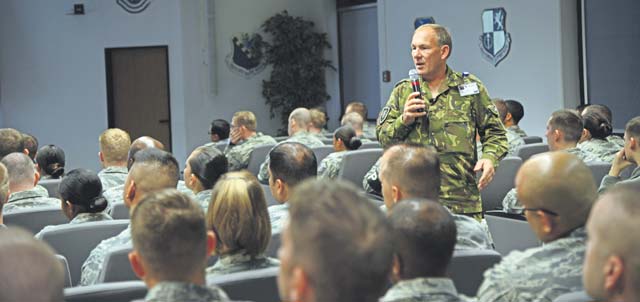
The KMC Top 3 Council presented the annual Cross-Cultural Awareness Professional Development Seminar Nov. 5 in the U.S. Air Forces in Europe and Air Forces Africa Kisling NCO Academy auditorium.
During the four-hour seminar, NATO leaders gave their perspective on cross-cultural awareness and engagement to KMC Airmen of all tiers and career fields.
“The purpose of this seminar is to showcase to our KMC military personnel what NATO is, how we fit into that picture and to give them the knowledge they need to operate in this environment,” said Senior Master Sgt. Travis Robbins, USAFE-AFAFRICA senior enlisted international engagement manager.
The seminar included briefs on cultural diversity, ethics, NATO’s mission and structure, and what it means to be an Alliance member.
Chief Warrant Officer Johannes Linnenbank, NATO School NCO Professional Department director, gave the briefs on cultural diversity and ethics.
“We all think we are open (minded), but in a lot of situations we are not as open as we think,” Linnenbank said. “I hope with these lectures we open minds.”
Linnenbank spoke of being culturally sensitive to differences on thoughts such as timeliness, food and alcohol, male and female roles, and sexuality.
Robbins, who travels around talking to different NCO corps, said the seminar is a great way to show Airmen the importance of what the U.S. is doing overseas as a member of NATO.
“I think it’s important for people serving, especially in this theater, to understand where they fit into that picture of NATO,” Robbins said. “We are not just the U.S. Air Force occupying a base over here and acting as a transient center. We are here to integrate with these partners and work with them every day to make them better and make us better at the same time.”
Master Aircrew Duncan Hide, Headquarters Allied Air Command senior NCO, echoed the sentiment during his brief on the NATO mission.
“The more we know about each other and the more we understand each other, the better we work together and the more interoperable we are,” Hide said.
Robbins said he hopes the Airmen that attended the seminar will take what they learned back to their work centers and discuss it.
“Hopefully, it helps people have a better understanding of why we are here, what NATO is and what we are moving toward,” he said.
Though the seminar focused on cultural diversity in an international setting, it was also noted the same considerations could be applied to a local setting.
“We want to get people to think about, ‘That could happen to me in an international setting, but that could also happen to me in my own headquarters,’” Linnenbank said. “How will you react? How can you react differently or better?”
Regardless of the location or organizations involved, the hope is the seminar helps increase the interoperability of all working together.
“We want to share and build in those relationships and partnerships,” Robbins said. “As we move forward in whatever endeavor NATO, USAFE, the Army or whoever is charged with, we can operate together and understand each other better.”







